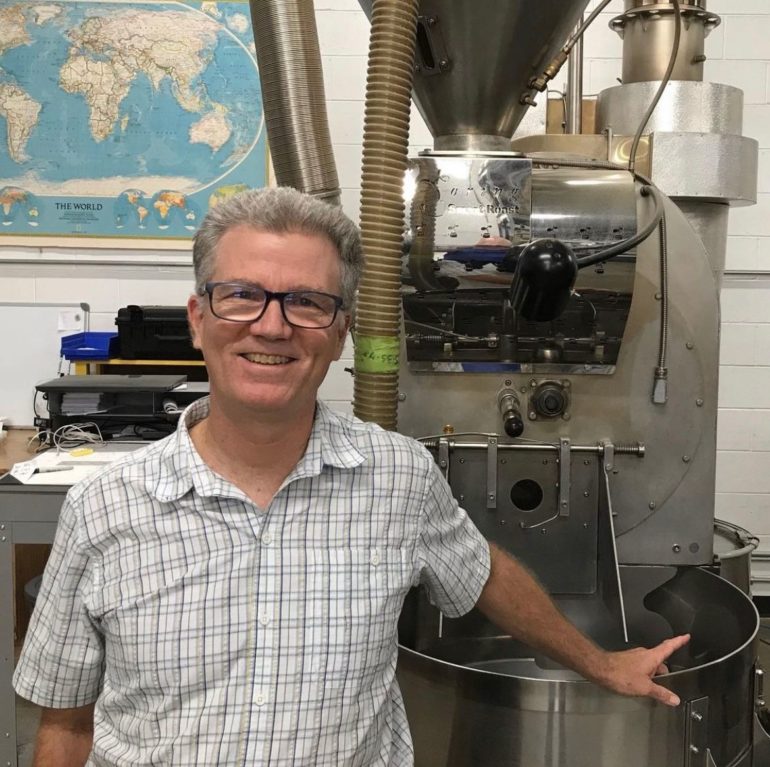
Robbie Roberts began roasting coffee in 1991. He founded the coffee company that became Joe Van Gogh, Inc., in 1994 and bought his first Loring ten years later. Joe Van Gogh roasts its coffee and runs its business from Hillsborough, NC, and it operates cafes in Durham and Chapel Hill, NC. Roberts lives in Chapel Hill.
How did you get into the coffee industry? What inspired you to start roasting?
We got into the coffee industry, and then friend of mine and I opened a roasting coffee house where we had to learn how to roast coffee. This was well before the ability to go out and go to coffee school, there was no such thing. You bought a roaster and the roaster manufacturer, in our case it was Probat, gave you a couple days to show you how it works when you turn it on, and then you went and learned. And that’s what I did, I roasted coffee, tasted coffee, roasted coffee, tasted coffee, and this was well before there were probes inside the drum, there might have been a thermometer stuck in the airflow that you could get some idea of the temperature of the air as it moved from the drum to the chaff collector, but really you kind of just started the stop watch and used your eyes and your ears and took a look at the coffee with the tester and decided when it was ready and then you drank some and changed what you were doing next time.
What coffee do you drink in the morning?
In the morning I drink whatever I happen to have brought home from the roastery. I try to try everything on a regular basis. Usually with an AeroPress, that’s what I usually do and I have my own AeroPress recipe. I’m glad to share it but it’s just one that works for me. And you know, one day it could be our holiday blend this time of year, that’s for sure, and then often a Guatemalan or a Mexican, those have been the really fun kind of single large and microlots that we’ve had, so I’ve drunk a lot of those. And then occasionally a washed or a natural African. Though in the morning I like Central and South American coffees or blends more. But I drink it black.
What is your favorite part of being a coffee roaster?
I really like the beginning of the day with the coffee roaster, meaning the actual machine. Getting it started, getting an idea of what were going to do today, kind of strategizing how the days going to go, and then once the machines warm, getting the first roast going and just kind of getting it with the groove. I’m ADD enough or maybe its ADHD, since I’ve had kids and that’s the way it’s been described, that the routine of thirteen fourteen minute at a time and then start again, and then start again, is a really satisfying.
What are common mistakes coffee roasters make and how can these be overcome?
Coffee roasters don’t really make many mistakes, I guess the mistake would be talking while your roasting coffee and not paying attention like you’re supposed to, answering the phone, just not focusing is the biggest mistake a coffee roaster can make. A coffee buyer can buy a coffee that can’t be roasted into something enjoyable, that’s a big mistake. So if the roaster is also the buyer then there’s the mistake that can be made.
What are you excited about in the world of coffee right now?
I’m still excited in the world of coffee, you could see hints of this coming out of El Salvador about 10 years ago. But the fact that processing methods, natural and honey, have gone everywhere there’s coffee instead of just Ethiopia. the climate and/or the economic politics in Central and South America did not lend themselves much to trying different processing methods for coffee. Now were going so far as adding different yeasts to the fermentation process and actually understanding more about the taste attributes that coffees can deliver, rather than just having natural coffees from Ethiopia and washed coffees from Central and South America.